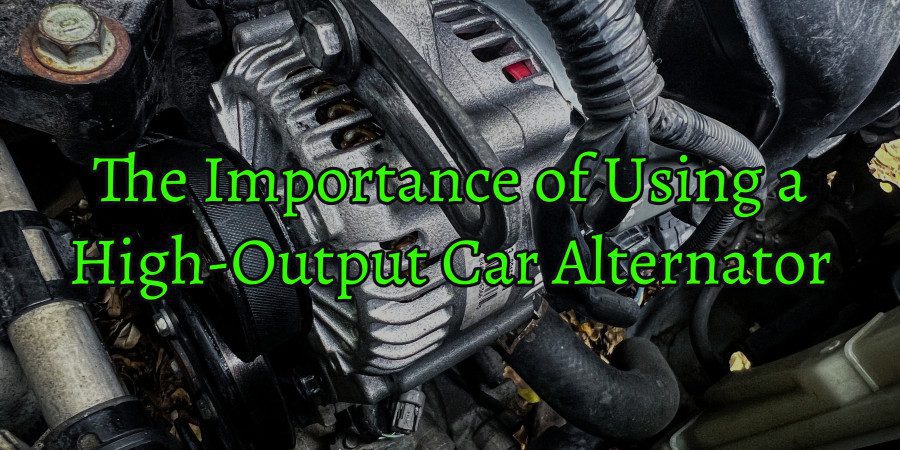
Do you know what a high-output car alternator does?
It is usually used to enhance the amperage within the car’s electrical system. High-output car alternators are generally quite expensive but are a good investment for your vehicle.
They are beneficial to the modern cars of today. They can be an absolute savior to your vehicle if the battery is poorly affected by too much pressure.
High-output car alternators can also help with higher electrical supplies for power windows, seats with heating and cooling systems, power gates, ignition systems, compressors, navigation systems, and more.
What is a High Output Car Alternator?
As mentioned in the introduction, a high-output car alternator enhances the amperage within the electrical system. The output is decreased when the alternator is not turning at the proper speed. It is unable to keep up with the charging system.
In this case, a battery would be doing double time to keep up. This would affect the battery’s power negatively and cause pressure to be put on it. This issue is where a high-output alternator comes in.
Experts say that you should use good quality high output alternators. Buying them used is not recommended.
A high-output car alternator is a small electromagnetic generator that transfers mechanical rotational energy into electrical energy. The vehicle uses electrical power to keep the headlights running, run the air conditioner, keep the battery charged, and run any other system in the car that uses electricity.
A high-output car alternator has two primary parts: the stator and the rotor. A stator is a series of copper wire coils that surround the rotor. This is the area where the electrical charge is produced.
The rotor is a rotating magnetic core that is sometimes called a flywheel. It is also attached to the drive system through the alternator pulley, which causes it to spin rapidly and creates the needed movement for the charge.
The automatic voltage regulator (AVR) controls the output, which keeps the high-output alternator from supplying too much current. A high-output alternator should never put out too much current, as it could damage the vehicle. It can only send out the amount of the current that is needed, no more.
A high-output alternator works by providing the required amps and can be used in case of alternator failure. This type of alternator is usually recommended when additional accessories are added to the vehicle, and the stock alternator might be unable to handle higher amps and voltage.
Do I Need a High Output Alternator?
Every vehicle needs to draw some amount of amperage power to function correctly. You may be fine with a stock alternator if you haven’t added any modifications or accessories. A good rule of thumb is that if you are planning on upping the requirements by more than 10 to 15 percent, a high-output alternator would be ideal for the task.
Types of High-Output Alternators
Different types of high-output alternators would depend upon the type of car, power requirements, and the vehicle’s functions. However, the three basic types of high-output alternators are considered to be:
- High-output alternators that are designed for audio and thus enhance sound systems
- High-output alternators that are made for running applications on the vehicle
- High-output alternators created for all functions of a vehicle
How Does a High Output Alternator Affect My Vehicle?
Your vehicle will have the following noticeable changes:
- Work more reliably
- Start easier
- Will charge the battery more
- Maintain the accessories better
- Won’t stall as much
These positive effects are why upgrading your high-output car alternator regularly is essential. Due to the flow of higher charges, a high-output alternator will also require you to change out the charge wires and ground straps with a thicker or higher gauge. These changes prevent the burning out of cables and connections and won’t damage the engine.
Can a High Output Alternator Go Bad?
The short answer is yes. A high-output alternator can go bad. This happens when the alternator is used in extreme conditions and is forced to produce higher amperage than it can handle.
Knowing your alternator’s output capacity and upgrading it when needed is crucial to prevent this.
Upgrading
Whenever you decide to upgrade your high-output alternator, it is imperative to examine your power draws and needs and check if the stock alternator can supply them. If so, or it is close to being able to provide, you should start upgrading this part before installing any other systems.
Benefits of Upgrading
- Upgrading will help save on fuel costs by making the vehicle run more efficiently.
- If any issues like frequent dead batteries, stalling, malfunctioning accessories, battery warning lights on your dashboard, strange sounds from under the hood, or trouble starting, it could be that the alternator needs an upgrade and will be an easy fix.
- Upgrading is simple and economical for fixing these issues.
- The vehicle will be more reliable, drive smoother, and last longer.
Performance Quality
Did you know that high-output alternators can be used for more than just cars? They can be used in almost any vehicle, such as boats, diesel trucks, and trains. Different electrical specifications must be considered for the different types of transportation.
These specifications include the number of watts and amps that are needed for the kind of vehicle.
Therefore, when purchasing a high-output alternator, you want to ensure it is of the highest possible quality and everything is in working order.
The question about using a high-output alternator is whether you want to add things to your vehicle. You can stick with a stock alternator if you’re not very flashy. However, if you’re keen on add-ons, you will need a high-output alternator sometime down the road.
